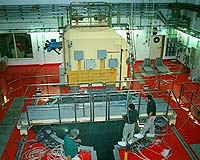 |
Berlin (UPI) Sep 7, 2010 The German government has agreed to extend the life of the country's nuclear power plants, a move that has the opposition and the renewable energy industry fuming. Germany's 17 reactors will remain online for an average of 12 years beyond their planned phase-out deadline in 2021 as a bridge technology until renewables are ready to take over completely, German Chancellor Angela Merkel revealed Monday. Reactors built before 1980 can remain online for 8 additional years, with newer reactors getting a 14-year extension. The decision is part of a major energy policy strategy paper the government presented to the public after marathon talks Sunday in the chancellor's office. The strategy update, long-called for by energy experts, sets out nine points to achieve "a clean, reliable and affordable energy supply" until 2050. Struck following months of wrangling with the country's large utilities, the strategy paper includes financial commitments from the nuclear industry to support renewable energy sources and energy efficiency measures in exchange for longer running times. It also ambitious pledges to green the country's energy mix. The paper reveals that Germany aims to boost the share of renewables to 80 percent of the electricity consumption until 2050; halve Germany's energy consumption by 2050; and reduce carbon dioxide emissions by 80 percent until 2050. Merkel hailed the deal "a revolution," adding that Germany's energy mix would become "the most efficient and environmentally friendly in the world." Yet the opposition has argued that the government has simply bowed before the nuclear lobby. Juergen Trittin, a former environment minister of the Green Party, denounced the deal as a "billion-euro gift for the likes of Eon, RWE, EnBW and Vattenfall," the country's main utilities. Longer running times will hand utilities $5 billion-$9 billion of additional profits per year, studies indicated. Sigmar Gabriel, the leader of the Social Democratic Party, the group that together with the nuclear industry drafted the reactor shut down plan in 2000, said the deal mean a "black day for Germany's energy policy, and for politics in general." The renewable energy industry has also issued angry statements, saying the government was putting the success story of renewables at risk by allowing the country's reactors to produce more power and "clogging the energy mix." Latest polls indicate that a majority of Germans oppose keeping the controversial energy source in the mix despite its revival elsewhere in the world. Critics of nuclear point to the dangers of accidents, proliferation and the unsolved issue of how to store the highly radioactive waste created in the process. However, volatile fossil fuel prices, energy security concerns and the need to cut CO2 emissions have given nuclear power a boost and Merkel has for years vowed to give the energy source a second chance. Berlin from the start said it wants cash in return for longer running times but a major lobbying campaign has tried to keep the financial damage as low as possible, with the utilities claiming that significant new taxes could render their reactors unprofitable. Sunday's decision was preceded by months of wrangling but government officials said Monday that the nuclear industry would commit its fair share to revolutionize the German energy mix. Companies agreed to pay around $380 million per year to support renewables and climate protection efforts, with total contributions to amount to $19 billion, the government said. The industry agreed to pay a new "fuel-rod" tax of around $3 billion per year starting in 2011. The tax is limited to 6 years only -- a negotiation victory for the utilities, observers say. Meanwhile, significant opposition to the deal, which has yet to be green-lighted by parliamentarians, is forming. Several unions announced protests of the nuclear extension, and Gabriel, of the Social Democrats, has vowed to scrap it if his party is re-elected in 2013. Until then, the opposition will fight the deal in court, it said.
Share This Article With Planet Earth
Related Links Nuclear Power News - Nuclear Science, Nuclear Technology Powering The World in the 21st Century at Energy-Daily.com
 Egypt nuclear reactor broke down in April: atomic chief
Egypt nuclear reactor broke down in April: atomic chiefCairo (AFP) Sept 7, 2010 An Egyptian nuclear reactor broke down in April but there was no radiation leak, the head of the country's atomic agency said on Tuesday. "There had been a mechanical failure of the cooling pump when the reactor was switched on," Mohammed al-Qolali told AFP, saying the reactor was quickly repaired. He said that during the failure there was "absolutely no" leak. Egypt, which launched ... read more |
|
| The content herein, unless otherwise known to be public domain, are Copyright 1995-2010 - SpaceDaily. AFP and UPI Wire Stories are copyright Agence France-Presse and United Press International. ESA Portal Reports are copyright European Space Agency. All NASA sourced material is public domain. Additional copyrights may apply in whole or part to other bona fide parties. Advertising does not imply endorsement,agreement or approval of any opinions, statements or information provided by SpaceDaily on any Web page published or hosted by SpaceDaily. Privacy Statement |